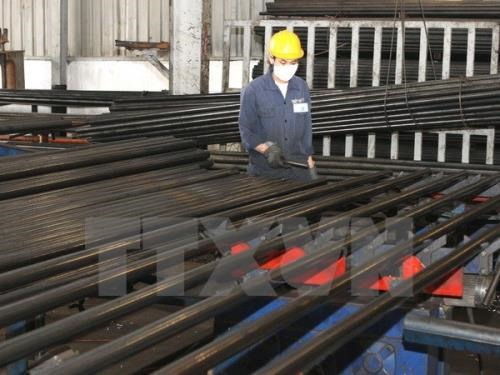 Economy
Economy

Vietnamese steel production and sales growth are slowing, while construction steel consumption has decreased, the Việt Nam Steel Association (VSA) announced.
 |
| Steel businesses have continued their discount and price guarantee policies, causing difficulties to the domestic market, VSA said. — Photo bnews.vn |
HÀ NỘI — Vietnamese steel production and sales growth are slowing, while construction steel consumption has decreased, the Việt Nam Steel Association (VSA) announced.
VSA said operation of steel plants both in the north and south last month was quiet compared to the previous month. Some firms have faced difficulties and could suffer losses soon.
Steel prices continue their downward trend, making competition to maintain market shares more severe.
The local steel price in April was reduced by VNĐ400-700 per kilo from the previous month to VNĐ10,600 – VNĐ10,800 excluding VAT.
VSA said the steel sales growth in the first four months of the year was only 2.7 per cent, much lower than the forecast of 10 per cent earlier this year.
The scrap price in the first half of this month decreased by $20-25 per tonne to $255-265 per tonne. The price of steel billet was sharply reduced by $20-25 per tonne to $390-400 per tonne.
Nguyễn Văn Sưa, VSA’s chairman, said its members’ construction steel April output was more than 730,000 tonnes, representing a slight year-on-year increase of 3.6 per cent. However, the output last month was reduced by 14 per cent from the previous month. Consumption of building steel last month also posted 14 per cent and 20 per cent decreases in comparison with the same period last year and previous month respectively to reach 635,000 tonnes.
Sưa said steel businesses have continued their discount and price guarantee policies, causing difficulties to the domestic market. Cheap imported rolled steel has also burdened local producers.
The association suggested that steel firms should keep the market stable, removing price guarantee policies while reducing and limiting sale support policies.
Local companies should regularly exchange information and report to the association to keep competition in the steel market healthy.
In addition, they should co-operate with each other to create a synchronous and sustainable association chain.
The association will continue to analyse and provide information on the massive imports of long steel pipes and rolled coat steel, as well as affects of taxes imposed on steel billet to local producers to avoid speculation. — VNS




